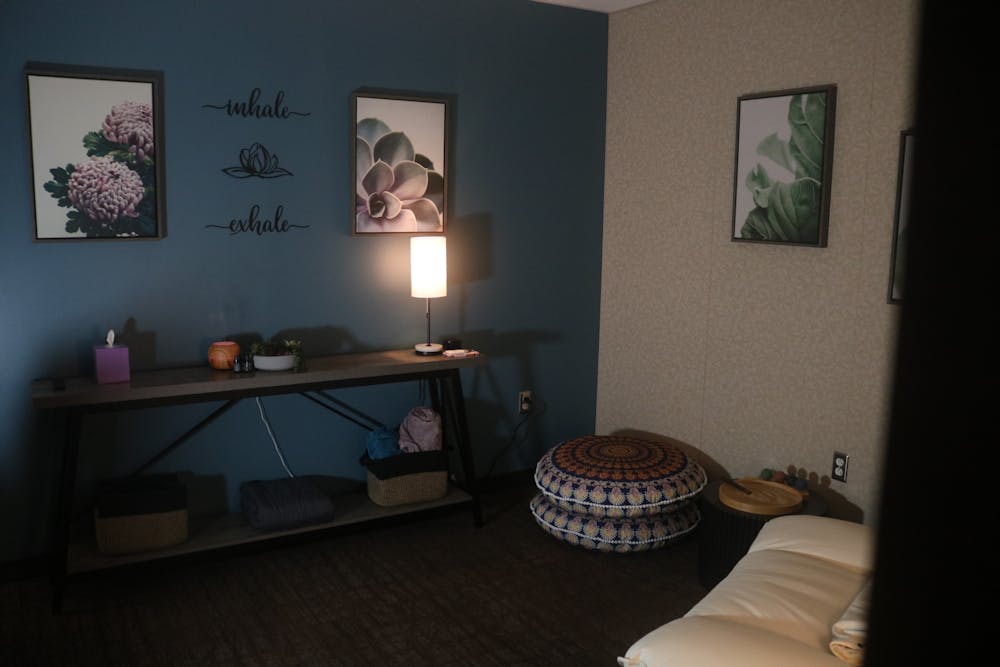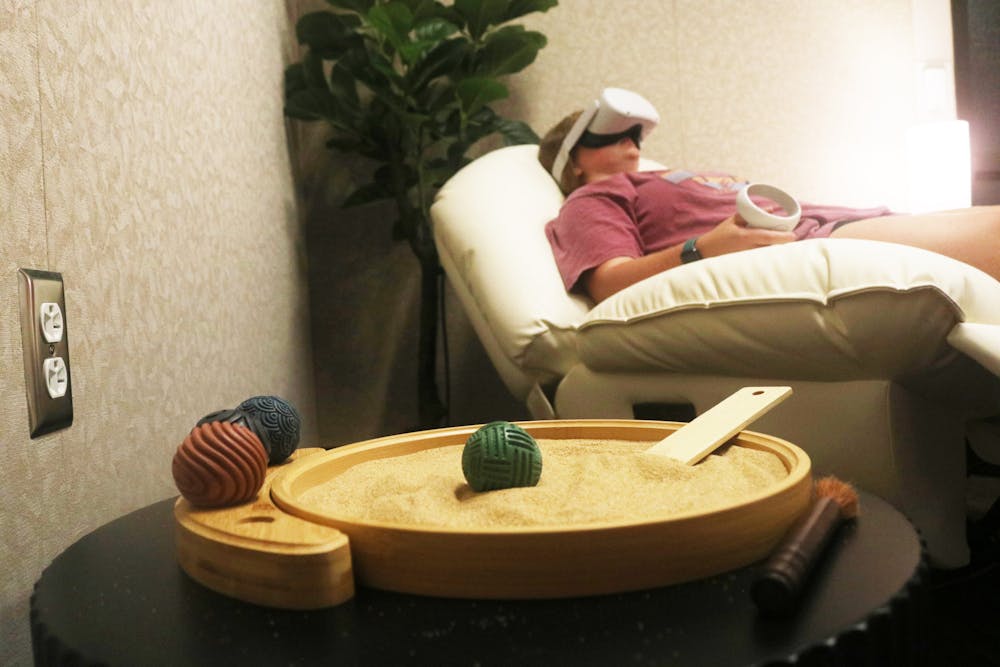Elon’s HealthEU program has opened two new spaces on campus for students to take a break from their daily stress.
The new spaces on campus have been built to encourage students to practice mindfulness. The spaces feature a number of tools designed to help students de-stress and provide an environment to learn new self care techniques.
The rooms come from funding provided by an endowment from Andrew G. Bennett ’08, according to Jana Lynn Patterson, associate vice president for student life.
The endowment previously funded “Safe Rides,” a service that was suspended in 2019.
“We talked with Andrew about, how would you like this repurposed?” Patterson said. “He really wanted something that would benefit student health and wellness.”
The endowment switched to funding the creation of two rooms on campus. The Serenity Suite in Ellington Center and the Mind Body Connection room in Koury Center.
“It's a place where folks can go to decompress,” Patterson said.
In addition to the new spaces, the endowment will also fund Student Wellness Innovation Grants. The grant will fund proposals from students for different initiatives to help students integrate wellness into their daily lives.
The Serenity Suite features a glider recliner, a sand tray, essential oils, zen coloring books, a light therapy lamp and a VR headset for students to practice guided meditation.
Anita Hodnett, director of counseling services, said the construction of the suite concentrated on finding purposeful pieces that can serve as different mindful practices. The sun lamp can help with seasonal depression, the zen cushions provide a spot for meditation, or students can choose to relax in the gliding, reclining chair.
“When designing the Serenity Suite, we really looked at how every element in the room is purposeful,” Hodnett said. “Everything in there is specifically to support that mindfulness, that engagement in a self-care practice.”
The Mind Body Connection room in the Koury Center is a dimly lit room located near the RecWell front desk, Patterson said. The room features a massage chair and different essential oil sprays for aromatherapy.
Interim Director of Campus Recreation and Wellness Charlotte Williams said the room’s main focus is the massage chair. The chair has features like lumbar heat, rollers for the different parts of the body, including the calves and arms, and the chair has “gravity positioning” which allows the user's knees to be elevated.
The aromatherapy can be used in the room by a diffuser or students can take home complimentary blends, Williams said. The diffuser will feature a new blend each month, each blend focusing on different benefits.
In the Koury Center, peer health educators can help facilitate the experience and explain the massage chair along with the different essential oils and their benefits.

The dimly lit Serenity Suite in Ellington Center, as seen on Aug. 30, offers zen cushions to meditate on, a zen sand garden and a gliding rocking chair for students.
The massage chair can help give a faster workout recovery and lower blood pressure and heart rate, according to Patterson.
Williams hopes that this room helps students to take into account all the different aspects of personal health and wellness.
“We really want them to look at the whole picture, making the connection between all of their dimensions of wellness,” Williams said.
Patterson said the room in the Koury Center is replicated after a successful aromatherapy space that's available to faculty and staff in their health and wellness center.
“Our whole focus or aim is to really emphasize the connection between the mental and physical dimensions in particular, and holistic wellness overall,” Williams said.
While both rooms can be used in tandem with other services located in their respective centers, the rooms can also be used as a standalone session.
“It can complement our services or it may just be that student was like, I'm not in the point in my life right now that I need to or I want to engage in counseling, but I love the idea of taking time to practice meditation or to mindfully color as a part of my just general self-care practices,” Hodnett said.
The new rooms come just months after plans for the new HealthEU center were announced.
“We want it to get a jump start on creating spaces for students that would promote wellbeing, that would promote self-care, that would invite students to kind of intentionally engage in wellness practices, in support of their mental health and then just their overall holistic wellbeing,” Hodnett said.
The Serenity Suite can also be used as a recommendation by counselors for students who may need a place to decompress after a session or could benefit from resources like the sunlamp, Hodnett said.
Hodnett and Patterson both said the spaces offer new resources to students to have time to decompress and take a break from daily stressors.
“We recognize that our students are active, busy, high achieving, kind of constantly involved and on the go,” Hodnett said. “And so sometimes it's easier said than done to encourage students to take a healthy break, just to create a pause or again, self-care or just a pause to breathe in.”
Patterson foresees more mindful practice strategies rolling out in the next few months.
“We don't want to wait on the building,” Patterson said. “But then when we get the building, when the building's finished, I think it's going to provide a centering and a core place.”
The new HealthEU Center is set to open in the summer of 2026 in the Innovation Quad. The building will house rec well and counseling services along with several other student resources, Patterson said.
Both rooms are available for any student to use. The serenity suite can be reserved by calling counseling services and the Mind Body Connection room in Koury can be reserved through the


